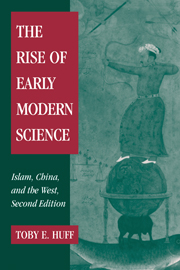Book contents
- Frontmatter
- Dedication
- Contents
- List of illustrations
- Preface to the second edition
- Preface to the first edition
- Acknowledgments
- Introduction
- 1 The comparative study of science
- 2 Arabic science and the Islamic world
- 3 Reason and rationality in Islam and the West
- 4 The European legal revolution
- 5 Madrasas, universities, and science
- 6 Cultural climates and the ethos of science
- 7 Science and civilization in China
- 8 Science and social organization in China
- 9 The rise of early modern science
- Epilogue: educational reform and attitudes toward science in the Muslim world and China since the eighteenth century
- Selected bibliography
- Index
2 - Arabic science and the Islamic world
Published online by Cambridge University Press: 05 June 2016
- Frontmatter
- Dedication
- Contents
- List of illustrations
- Preface to the second edition
- Preface to the first edition
- Acknowledgments
- Introduction
- 1 The comparative study of science
- 2 Arabic science and the Islamic world
- 3 Reason and rationality in Islam and the West
- 4 The European legal revolution
- 5 Madrasas, universities, and science
- 6 Cultural climates and the ethos of science
- 7 Science and civilization in China
- 8 Science and social organization in China
- 9 The rise of early modern science
- Epilogue: educational reform and attitudes toward science in the Muslim world and China since the eighteenth century
- Selected bibliography
- Index
Summary
The problem of Arabic science
The problem of Arabic science has at least two dimensions. One concerns the failure of Arabic science to give birth to modern science; the other concerns the apparent decline and retrogression of scientific thought and practice in Arabic-Islamic civilization after the thirteenth century. Although the question of why intellectual thought retrogressed after the golden era is a matter of considerable interest to the inhabitants of the contemporary Muslim world, it is a problem that lies outside the bounds of the present inquiry.
Our concern is with the fact that from the eighth century to the end of the fourteenth, Arabic science was probably the most advanced science in the world, greatly surpassing the West and China. In virtually every field of endeavor – in astronomy, alchemy, mathematics, medicine, optics, and so forth – Arabic scientists (that is, Middle Eastern individuals primarily using the Arabic language but including Arabs, Iranians, Christians, Jews, and others) were in the forefront of scientific advance. The facts, theories, and scientific speculations contained in their treatises were the most advanced to be had anywhere in the world, including China. This is illustrated by the following considerations.
While the Greek scientific heritage was lost to the Western world for the centuries between the collapse of the Roman Empire in the fifth century and the great translation movement of the twelfth and thirteenth centuries, the Arabs4 had virtually full access to that heritage from the eighth century onward. This occurred because of a momentous translation effort whereby the great works of Greece and other cultures were translated into Arabic. While the transmission of these ancient sciences into Arabic-Islamic civilization was selective, it was thoroughly representative of Greek scientific and philosophic thought as a whole. Moreover, the Arabic borrowing of the Hindu numeral system must be accorded high recognition.
- Type
- Chapter
- Information
- The Rise of Early Modern ScienceIslam, China and the West, pp. 47 - 88Publisher: Cambridge University PressPrint publication year: 2003

